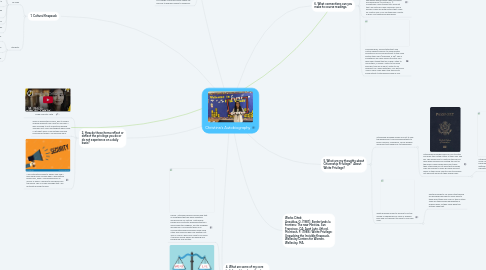
1. 1. Cultural Knapsack
1.1. My Own
1.1.1. I grew up with both my parents married to each other.
1.1.2. I've had healthcare my entire life.
1.1.3. I've never gone hungry a single day.
1.1.4. I grew up in a middle class household.
1.1.5. I had to opportunity to complete my K-12 education experience.
1.1.6. I have the opportunity to finished college and get a Bachelors in Early Childhood Education.
1.1.7. I was born a citizen of the United States.
1.1.8. I can speak to any officer with the laws without fear.
1.2. Students
1.2.1. Some students have grown up in a world of technological advances.
1.2.2. Many of my students have experienced different family dynamics and possess the ability to empathize with one another.
1.2.3. Many of my students have seen the best and the worst in people from a young age.
2. 2. How do these items reflect or deflect the privilege you do or do not experience on a daily basis?
2.1. Model Minority Myth
2.2. While in elementary school, due to simply looking different from most of my peers I was assumed to not understand English. Teachers felt I was unintelligent when really I just didn't have a comfortable learning environment where I could speak up in.
2.3. I am fortunate enough to always feel safe. I have never been scared when I was getting pulled over, when I was walking near an officer or when I needed to seek help from the police. This is a daily privilege that I am fortunate enough to have.
3. 3. What values affect how I behave and communicate with others?
3.1. Family: Being a Vietnamese American I hold family very close to my heart and take family very seriously.
3.2. Education is important to myself. That something that affects my conversations with others.
3.3. I grew up in a culture that does not use eye-contact. This is something that I find very difficult with communicating with others. I grew up in a culture where making eye-contact was starting a confrontation with someone
3.4. I grew up in a passive culture where you are always suppose to agree with whoever is in charge. This many times makes me nervous to express myself to superiors.
4. 4. What are some of my core beliefs and how have they been culturally influenced?
4.1. Karma: I strongly believe in karma and that is something that has been definitely influenced by my culture. Vietnamese people are constantly preaching that you should help thy neighbor, and thy neighbor will help you. My parents grew up in communities where everyone knew each other and everyone help one another out. This is a value I hold very close to me since I think we should always be helping and building up one another.
4.2. Balance: One of my main core beliefs is balance. It is important to work hard, but it's also important to step back and see what you have worked hard for and enjoy it. This belief is also very connected to culture since in Vietnam many people work 30 hours or less weekly in order to enjoy their lives. Afternoons are spent outside with neighbors or with family enjoying a good meal and having fun. It's important to work but it's also important to spend time living your life with your family.
4.3. Loyalty is everything to me. I think it's important to be loyal to your partner, your family, your friends, your loved ones, your co-workers, your boss and everyone else you encounter in your life. Loyalty is part of building a relationship with the people in your lives. It's how you share with them that you want to be a positive impact on their lives and they will do the same in return.
5. 5. What are my thoughts about Citizenship Privilege? About White Privilege?
5.1. Citizenship privilege allows one not to fear the government. This privilege extents to police officers, counselors, social workers and every time people fill out paperwork.
5.1.1. Citizenship privileges allow for one to enter and leave the United States at their own free will. This allows you to continue the life you have while learning and visiting the rest of the globe. Many people who don't have their citizenship do not have that privilege. They are scared to every go back and visit family in their home country due to possibly not being let back into their regular lives.
5.1.1.1. Citizenship allows for access to education. Many college students struggle between being able to be allowed into college or getting loans in order to pay for their education.
5.2. White privilege mean to be able to not be scared of speaking your mind or arguing back and not having it tie back to your skin color.
5.2.1. White privilege to me means that people are privileged enough to never have to think about their skin color or their culture. They see themselves represented in endless ways so they never have the actively seek that.
